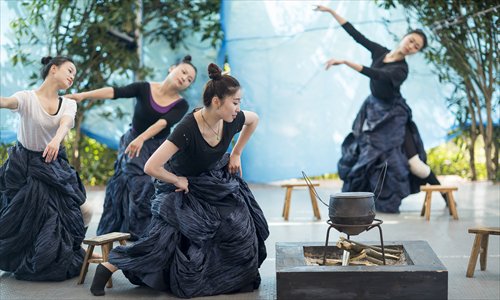‘Ballads from Grandma’
Famed dancer looks to bring Miao ethnic culture to the world

Dancers rehearse for Wuka Tiaoqia on April 22 in Huangping county, Guizhou Province. Photo: Courtesy of Gao Yun
Wang Xiaoying, 24-year-old mother to a 7-year-old, has long awaited a chance to prove herself a good dancer. Now that chance has finally arrived as she and her fellow villagers will step on stage in Beijing to perform the Miao group dance poem Wuka Tiaoqia (Ballads from Grandma) on May 16 and 17.
Just three months ago, Wang was living in a remote village in Southwest China's fifth-tier county of Huangping, Qiandongnan Miao and Dong Autonomous Prefecture, Guizhou Province, where she took care of her son just like many of the other Miao ethnic minority dancers in the troupe. However, after taking part in a song and dance talent show held at a local square, she was picked up by Long A'duo, a well-known Miao ethnic minority dancer and director and long-time collaborative partner with director Zhang Yimou.
After working with Zhang on the opening ceremony for the Beijing Olympics in 2008, Long began working on her own with a focus on exploring the cultures of China's ethnic minority groups, including her own Miao culture. "As a member of such a glorious and great people, I feel it's my obligation to find ways to preserve our culture and allow more people to get to know our past," Long said in an interview with the Global Times.
Ancient melodies
At first, Long only had a rough idea of what exactly constituted Miao culture. "I used to talk with my grandma in the Miao language, which is still wildly used in many tribe villages here," she said. "My grandma always sung traditional Miao songs for me when I was young. They covered everything from the long history of our nation to philosophy about life."
Although the Miao don't have a written history, for a thousand years they have passed down an oral history from one generation to the next. According to Yang De, director of the county's Culture Bureau, traditional songs have long been an effective way to record the every day life of the Miao people.
"Our people like to sing all the time, even when drinking, eating and doing farm work. When we set out to collect ancient songs for this dance show, we discovered that although they have similar tunes they have various lyrical forms," Yang said.
In the eyes of director Long and show producer Gao Yun, incorporating Miao's unique huotang (fireplace) culture is an absolute must for the show.
"From my more than two months of research in their villages, I found that every family has a fireplace and that every major event takes place around it. This is why our dance show has to make that our center stage," Gao said.
After months of research, song collecting and panel discussions, Long and her team finally developed Wuka Tiaoqia, a new form of dance they call a "dance poem."
Memories of Wuka
For many Miao people who grew up accompanied by songs sung by their grandmothers, wuka (grandmother) is a word full of warmth. Combining the unique movements of traditional Miao dance with modern dance, Wuka Tiaoqia includes six acts that take a short look at the history of the whole nation. Starting from the era when the Miao people were forced to leave the central part of China after losing a war and migrated to China's southwest mountainous areas, the performance follows them as they reach new areas and plant maple trees. If the trees survive they make this new place their home, if not they continue on to other areas.
"The Miao people see maple trees as their totem. They also appear in our tales about the origins of mankind. A maple tree gives birth to Butterfly Mom, who then falls love with Wind God and lays 12 eggs with him. Then our ancestor Aye comes to life," Long said.
Eyes on overseas markets
Wang and 19 other dancers are still rehearsing over and over for the upcoming stage performance. Eighty percent of them are amateurs selected by Long and Gao from local villages and few have stage experience. But neither Long nor Gao is worried about letting them step on stage. "No professional dance training, no dazzling special effects or costly stage design, but they are very serious about presenting the culture of their nation to outsiders," said Long, who left Huangping at age 11 to pursue further dance education in Beijing. "It is their vigor and spirit that moves and attracts people. They were sales assistants, farmers and even housewives before, but they are Miao when everything is said and done. "
Both Gao and Long see the two performances in Beijing as a means to test the waters and plan on modifying the performance for the international market. "This has to be a performance for an international audience. After I visited the US years ago, I had the idea to create a show to present our culture, which the people there both love and are fascinated by," Long told the Global Times.
Gao added that with their simple stage design and minimum props, they will be able to travel to any place they can take their mini wooden benches and drums.